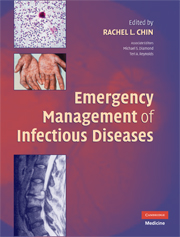Book contents
- Frontmatter
- Contents
- Preface
- Contributors
- Part I Systems
- 1 Infective Endocarditis
- 2 Myocarditis and Pericarditis
- 3 Dental and Odontogenic Infections
- 4 Systemic Diseases Causing Fever and Rash
- 5 Otitis Media
- 6 Otitis Externa
- 7 Sinusitis
- 8 Supraglottitis
- 9 Pharyngitis and Tonsillitis
- 10 Deep Neck Space Infections
- 11 Mumps
- 12 Peritonitis
- 13 Viral Hepatitis
- 14 Infectious Biliary Diseases: Cholecystitis and Cholangitis
- 15 Acute Infectious Diarrhea
- 16 Diarrhea in HIV-Infected Patients
- 17 Ulcerative Sexually Transmitted Diseases
- 18 Nonulcerative Sexually Transmitted Diseases
- 19 Vulvovaginitis
- 20 Male Genitourinary Infections
- 21 Adult Septic Arthritis
- 22 Hand Infections: Fight Bite, Purulent Tenosynovitis, Felon, and Paronychia
- 23 Osteomyelitis
- 24 Open Fractures
- 25 Spinal Infections
- 26 Prosthetic Joint Infections
- 27 Diabetic Foot Infections
- 28 Plantar Puncture Wounds
- 29 Periocular Infections
- 30 Conjunctival and Corneal Infections
- 31 Uvea, Vitreous, and Retina Infections
- 32 Community-Acquired Pneumonia
- 33 Tuberculosis
- 34 Influenza
- 35 HIV-Associated Respiratory Infections
- 36 Arthritis in the Acute Care Setting
- 37 Lower Urinary Tract Infection in Adults
- 38 Pyelonephritis in Adults
- 39 Fever and Headache: Meningitis and Encephalitis
- 40 Fever and Focal Cerebral Dysfunction
- 41 Fever and Acute Weakness Localizing to the Spinal Cord
- 42 Altered Mental Status in HIV-Infected Patients
- 43 Bacterial Skin and Soft-Tissue Infections
- Part II Pediatrics
- Part III Special Populations
- Part IV Current Topics
- Part V Overview of Antibiotics
- Part VI Microbiology/Laboratory Tests
- Part VII Infection Control Precautions
- Index
- References
6 - Otitis Externa
from Part I - Systems
Published online by Cambridge University Press: 15 December 2009
- Frontmatter
- Contents
- Preface
- Contributors
- Part I Systems
- 1 Infective Endocarditis
- 2 Myocarditis and Pericarditis
- 3 Dental and Odontogenic Infections
- 4 Systemic Diseases Causing Fever and Rash
- 5 Otitis Media
- 6 Otitis Externa
- 7 Sinusitis
- 8 Supraglottitis
- 9 Pharyngitis and Tonsillitis
- 10 Deep Neck Space Infections
- 11 Mumps
- 12 Peritonitis
- 13 Viral Hepatitis
- 14 Infectious Biliary Diseases: Cholecystitis and Cholangitis
- 15 Acute Infectious Diarrhea
- 16 Diarrhea in HIV-Infected Patients
- 17 Ulcerative Sexually Transmitted Diseases
- 18 Nonulcerative Sexually Transmitted Diseases
- 19 Vulvovaginitis
- 20 Male Genitourinary Infections
- 21 Adult Septic Arthritis
- 22 Hand Infections: Fight Bite, Purulent Tenosynovitis, Felon, and Paronychia
- 23 Osteomyelitis
- 24 Open Fractures
- 25 Spinal Infections
- 26 Prosthetic Joint Infections
- 27 Diabetic Foot Infections
- 28 Plantar Puncture Wounds
- 29 Periocular Infections
- 30 Conjunctival and Corneal Infections
- 31 Uvea, Vitreous, and Retina Infections
- 32 Community-Acquired Pneumonia
- 33 Tuberculosis
- 34 Influenza
- 35 HIV-Associated Respiratory Infections
- 36 Arthritis in the Acute Care Setting
- 37 Lower Urinary Tract Infection in Adults
- 38 Pyelonephritis in Adults
- 39 Fever and Headache: Meningitis and Encephalitis
- 40 Fever and Focal Cerebral Dysfunction
- 41 Fever and Acute Weakness Localizing to the Spinal Cord
- 42 Altered Mental Status in HIV-Infected Patients
- 43 Bacterial Skin and Soft-Tissue Infections
- Part II Pediatrics
- Part III Special Populations
- Part IV Current Topics
- Part V Overview of Antibiotics
- Part VI Microbiology/Laboratory Tests
- Part VII Infection Control Precautions
- Index
- References
Summary
INTRODUCTION – AGENTS
Otitis externa (OE) or “swimmer's ear” is a relatively common infection of the pinna and/or external auditory canal. Most episodes of OE are caused by Pseudomonas aeruginosa. Other bacterial etiologies include Staphylococcus aureus, other Staphylococcus spp., Streptococcus, Proteus, and Klebsiella.
OE can occasionally be caused by fungi, most often Aspergillus species such as Aspergillus niger, flavus, and fumigatus. Candida albicans can also cause OE.
Less commonly, a herpetic viral etiology can cause OE, or an eruption of herpetic vesicles can become secondarily infected by bacteria.
EPIDEMIOLOGY
Otitis externa occurs in both children and adults, and is often seen in months when swimming is a popular activity. This association may result from injury to the ear canal skin in the process of drying ears after swimming, which facilitates bacterial infection. Patients with chronic moisture in their ears are more susceptible to OE, and increased incidence is seen in warm, humid environments and seasons. Hearing aid wearers or frequent ear-plug users may also be at increased risk.
A history of trauma, laceration, or a recent intra-aural foreign body may be an inciting event. Overaggressive Q-tip users are frequent OE patients because of abrasion and subsequent infection of the ear canal. A careful history must be elicited in refractory cases, because although patients may have claimed that they have ceased using Q-tips, other objects such as pins, paper clips, and the ends of eyeglasses are often substituted.
- Type
- Chapter
- Information
- Emergency Management of Infectious Diseases , pp. 37 - 38Publisher: Cambridge University PressPrint publication year: 2008



